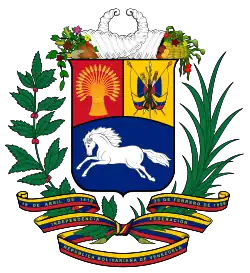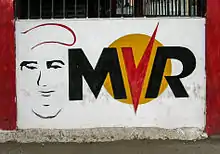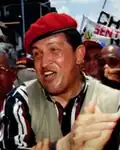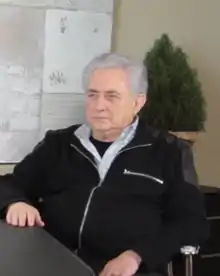1998 Venezuelan presidential election
Presidential elections were held in Venezuela on 6 December 1998. The main candidates were Hugo Chávez, a career military officer who led a coup d'état against then-president Carlos Andrés Pérez in 1992; and former Carabobo Governor Henrique Salas Römer. Both candidates represented newly formed parties, a first in a country where the main candidates always represented the parties of the bipartisanship. Chávez represented the Fifth Republic Movement (MVR), while Salas Römer represented Project Venezuela. Initially weak in the polls, Chávez ran on an anti-corruption and anti-poverty platform, condemning the two major parties that had dominated Venezuelan politics since 1958; and began to gain ground in the polls after the previous front runners faded. Despite the fact that the major parties (Copei and Democratic Action) endorsed Salas Römer, Chávez was elected into his first term as President of Venezuela.
| |||||||||||||||||
| Turnout | 63.45% | ||||||||||||||||
|---|---|---|---|---|---|---|---|---|---|---|---|---|---|---|---|---|---|
| |||||||||||||||||
 Presidential election results map. States won by Chávez States won by Salas Römer | |||||||||||||||||
| |||||||||||||||||
 |
|---|
|
|
A political realignment, the result meant the end of the bipartisanship that had dominated the political atmosphere of the country in the last 40 years, and the beginning of the dominance of the new MVR party (later merged into the United Socialist Party of Venezuela) and the Bolivarian Revolution, system that still holds political power in Venezuela as of October 2023.
Background
In the early 1990s the Venezuelan government's economic strength and political legitimacy was declining, with two coup attempts in 1992 and the impeachment for corruption of President Carlos Andrés Pérez. The result was a turn against the traditional Puntofijo Pact parties (Democratic Action and Copei) in the 1993 elections: Rafael Caldera's victory in 1993 was the first time in Venezuela's democratic history that a President had been elected without the support of either of the two major parties.[1] It was symptomatic that Caldera's election platform included pardoning those who had participated in the coup attempts, and he did so in 1994. Hugo Chávez, imprisoned for his role in the February 1992 coup attempt, was among those released.
By 1998, the economic crisis had grown even worse. Per capita GDP was at the same level as 1963, down a third from its 1978 peak; the purchasing power of the average salary was a third of its 1978 level.[2]
Chávez's participation
For a number of years after his 1994 release from prison, Chávez maintained a position against participation in elections, believing them a fixed game which merely legitimated the established order.[3] This led to a split with his colleague Francisco Arias Cárdenas, who left the MBR-200.[3] In the early years after his release, Chávez considered the possibility of another coup attempt, but with the prospects appearing slim, some advisers, notably Luis Miquilena, urged him to reconsider his scepticism of the elections, arguing that Chávez could potentially win so convincingly that the establishment would not be able to deny him victory.[3] To find out whether this was the case, Chávez set up teams of psychologists, sociologists, university professors and students to carry out a survey. With their support, grassroots members of the Bolivarian movement polled tens of thousands of people across the country. The results showed that 70% of respondents supported Chávez running for the presidency – and 57% said they would vote for him.[3] Support for the electoral route was strengthened when Arias Cárdenas, as a candidate for Radical Cause, won the Governorship of Zulia State in the December 1995 regional elections.[3] Despite this, the MBR-200 remained divided over electoral participation, and spent a year debating the issue in local, regional and national assemblies. A national congress on 19 April 1997 took from 9 am until 2 am the next day to reach a conclusion, ultimately deciding to launch Chávez' candidacy. Some members of the movement resigned in protest, holding too much at stake.[3] In July 1997 Chávez registered the new Fifth Republic Movement with the National Electoral Council (the name had to be changed as Venezuelan law did not permit parties to use Simón Bolívar's name).[3] The international media took little interest, citing opinion polls showing 8% support for Chávez.[3]
Electoral process
The 1998 elections were the first to be carried out with a non-partisan National Electoral Council.[4] Traditionally poll workers had been provided by the parties, but in this election "a lottery was set up to draft 300,000 registered voters as poll workers".[4] The elections also saw "the world's first automated voting system, which featured a single integrated electronic network that was supposed to transmit the results from the polling stations to central headquarters within minutes."[4] Whilst Venezuela had traditionally provided election observers to other Latin American countries, the uncertainty of the new system and the possibility of handover to a non-traditional party raised the stakes in terms of demonstrating that the elections would be fair, and Venezuela invited international election observers for the first time.[4] The Organization of American States, European Union, Carter Center and International Republican Institute all sent delegations.[4]
The automated vote system enabled the Electoral Council to announce the results within 2.5 hours of the polls closing.[4] After corroborating the results with the Carter Center, the losing candidate conceded several hours later.[4]
Campaign
The campaign was dominated by independent candidates, as the electorate completed the turn against the establishment parties begun in 1993. In the final poll of the year in December 1997 Irene Sáez, a former beauty queen (Miss Universe 1981[5]) and mayor of the Caracas district of Chacao, reached almost 70% as an independent candidate.[1] However, despite spending millions of dollars on publicity, she fell below 15% within six months, as the public became increasingly sceptical of her readiness for the Presidency, and as she lost credibility as an anti-establishment candidate after accepting the endorsement of COPEI.[1] The other early leading candidate, the former Democratic Action leader Claudio Fermín, reached 35% in December 1997, but fell to 6% by April 1998.[4]
During 1998, it then became increasingly clear that the campaign was a race between Salas Römer and Chávez. Salas Römer, the governor of Carabobo and leader of the new Project Venezuela party, appeared a credible candidate as Sáez lost ground,[1] and reached 21% in the polls in August 1998.[4] However at the same time, Chávez's own campaign gained ground as he established himself with the electorate. From around 5% in September 1997 to over 10% in late February 1998,[6] Chávez registered 30% in polls taken in May 1998; by August he was registering 39%.
The Chávez platform comprised three basic pledges. First to begin his presidency by abolishing Venezuela's old puntofijismo political system of two-party patronage, and opening up political power to independent and third parties. Second, to end corruption. Third, to eradicate poverty in Venezuela. In working to gain the trust of voters, Chávez drafted an agenda that drew heavily on his interpretation of Bolivarianism.[7] Chávez also utilized his charisma and flamboyant public speaking style—noted for its abundance of colloquialisms and ribald manner—on the campaign trail to help win the trust and favor of a primarily poor and working class following.[7][8] On one occasion, he threatened to "fry" the heads of his opponents.[9]
The two traditional main parties hoped that 8 November parliamentary and regional elections would give them a boost, a month ahead of 8 December presidential elections, but the poll remained a two-horse race.[4] At this point polls generally showed Chávez with a 6–12-point lead over Salas Römer's approximately 38% poll numbers, though in some polls he exceeded that margin.[4] Both COPEI and Democratic Action now sought to endorse Salas Römer (he was reluctant to accept). COPEI persuaded its candidate (Sáez) to resign, but Democratic Action's candidate, Alfaro Ucero, refused to do so, triggering an electoral crisis as the National Electoral Council had to rule on whether the Democratic Action ballot slot belonged to the party or the candidate.[4] Salas Römer agreed to accept the endorsement of COPEI and Democratic Action regional and local parties, and sought to maintain a distance to the parties' national leadership.[4] In the end, it was not enough, and Chávez won a substantial majority, and won 17 of 23 states.[4]
Results

| Candidate | Party | Votes | % | |
|---|---|---|---|---|
| Hugo Chávez | Fifth Republic Movement | 3,673,685 | 56.20 | |
| Henrique Salas Römer | Project Venezuela | 2,613,161 | 39.97 | |
| Irene Sáez | Integration, Representation and New Hope | 184,568 | 2.82 | |
| Luis Alfaro Ucero | Authentic Renewal Organization | 27,586 | 0.42 | |
| Miguel Rodríguez | Opening for National Participation | 19,629 | 0.30 | |
| Alfredo Ramos | Radical Cause | 7,275 | 0.11 | |
| Radamés Munóz León | New Way | 2,919 | 0.04 | |
| Oswaldo Sujú Raffo | Sovereign Front | 2,901 | 0.04 | |
| Alejandro Peña Esclusa | Venezuelan Labour Party | 2,424 | 0.04 | |
| Domenico Tanzi | Complementary Participation | 1,900 | 0.03 | |
| Ignacio Quintana | National Opinion | 1,256 | 0.02 | |
| Total | 6,537,304 | 100.00 | ||
| Valid votes | 6,537,304 | 93.55 | ||
| Invalid/blank votes | 450,987 | 6.45 | ||
| Total votes | 6,988,291 | 100.00 | ||
| Registered voters/turnout | 11,013,020 | 63.45 | ||
| Source: CNE | ||||
Reactions
Domestic
Following his victory, Chávez promised that he would not devalue the bolivar and that currency controls would not be created.[9] Salas Römer reacted to the results stating "I not only accept the victory of my adversary but wish him luck, lots of luck, because his luck will be that of Venezuela".[9] Some Chávez supporters reacted to his election by saying that they would accept an authoritarian government under Chávez if he decided to utilize such form of government.[9]
International
The United States reacted cautiously, with American Ambassador John Maisto stating that "With respect to what we know about Mr. Chavez's platform, we will have to see what his policies are, in fact, and see whom he will appoint to key positions".[9]
References
- McCoy, Jennifer (2006), "From Representative to Participatory Democracy?", in McCoy, Jennifer and Myers, David (eds, 2006), The Unraveling of Representative Democracy in Venezuela, Johns Hopkins University Press. p. 276
- Kelly, Janet, and Palma, Pedro (2006), "The Syndrome of Economic Decline and the Quest for Change", in McCoy, Jennifer and Myers, David (eds, 2006), The Unraveling of Representative Democracy in Venezuela, Johns Hopkins University Press. p. 207
- Jones (2008:202-4)
- McCoy, Jennifer (1999), "Chavez and the End of "Partyarchy" in Venezuela", Journal of Democracy, 10(3), pp. 64–77
- St. Petersburg Times, 21 July 1981, "Miss Venezuela Chosen World's Most Beautiful", p3A
- Jones, Bart (2008), Hugo! The Hugo Chavez Story from Mud Hut to Perpetual Revolution, London: The Bodley Head, p. 215
- Guillermo Prieto, Alma (6 October 2005). "Don't Cry for Me, Venezuela". New York Review of Books.
- McCoy & Trinkunas 1999, p. 49.
- Johnson, Tim (6 December 1998). "Coup Leader Elected President". Miami Herald. Retrieved 10 December 2018.
Further reading
- Trinkunas, Harold; McCoy, Jennifer (February 1999). Observation of the 1998 Venezuelan Elections (PDF). The Carter Center (Report). Atlanta, GA. p. 49. Retrieved 8 January 2021.

